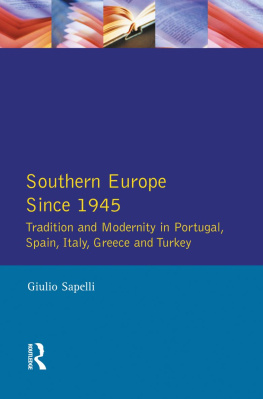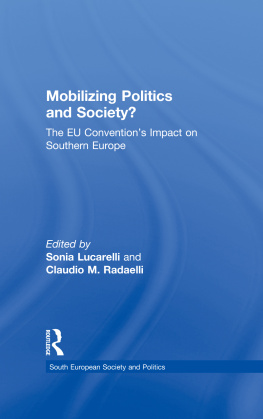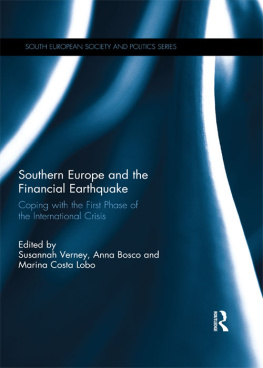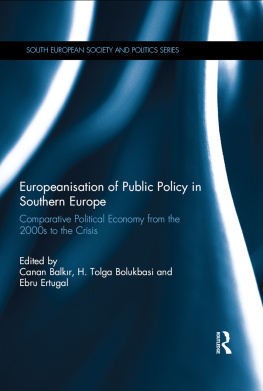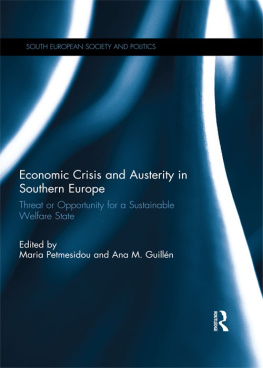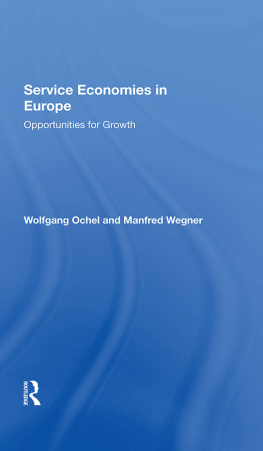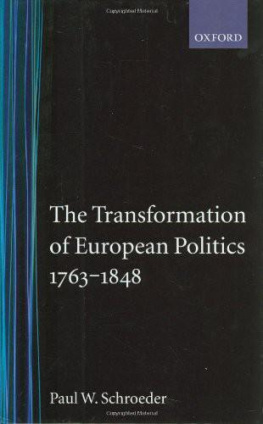SOUTHERN EUROPE SINCE 1945
SOUTHERN EUROPE SINCE 1945
Tradition and modernity in Portugal, Spain, Italy, Greece and Turkey
Giulio Sapelli
Translated by Ann Fuller
First published 1995 by Longman Group Limited
Published 2014 by Routledge
2 Park Square, Milton Park, Abingdon, Oxon OX14 4RN
711 Third Avenue, New York, NY 10017, USA
Routledge is an imprint of the Taylor & Francis Group, an informa business
Copyright 1995, Taylor & Francis.
All rights reserved. No part of this book may be reprinted or reproduced or utilised in any form or by any electronic, mechanical, or other means, now known or hereafter invented, including photocopying and recording, or in any information storage or retrieval system, without permission in writing from the publishers.
Notices
Knowledge and best practice in this field are constantly changing. As new research and experience broaden our understanding, changes in research methods, professional practices, or medical treatment may become necessary.
Practitioners and researchers must always rely on their own experience and knowledge in evaluating and using any information, methods, compounds, or experiments described herein. In using such information or methods they should be mindful of their own safety and the safety of others, including parties for whom they have a professional responsibility.
To the fullest extent of the law, neither the Publisher nor the authors, contributors, or editors, assume any liability for any injury and/or damage to persons or property as a matter of products liability, negligence or otherwise, or from any use or operation of any methods, products, instructions, or ideas contained in the material herein.
ISBN 13: 978-0-582-07065-3 (pbk)
British Library Cataloguing-in-Publication Data
A catalogue record for this book is available from the British Library
Library of Congress Cataloging-in-Publication Data
A catalogue record for this book is available from the Library of Congress
CONTENTS
This book is the result of many years of study and research during which time I have been able to count on the friendship of many scholars and the help of various institutions.
In particular, I would like to mention Maurice Aymard and our frequent discussions at the start of this project when I was Director of Studies at the Maison des Sciences de lHomme and Ecole des Hautes Etudes en Sciences Sociales. I would also like to thank Antonio Elorza and Paco Comin for the help they gave me during my studies in Madrid, and Paco Bonamusa and Pere Gabriel who enabled me to teach and study at the Autonomous University of Barcelona.
My most sincere and affectionate thanks go to Kemal Karpat, that most excellent and affable teacher. Not only did he encourage me to start my studies on modern Turkey, but he also offered valuable advice and help with the final manuscript.
This book covers a great deal of geographical territory and my studies led me to many places. The expenses involved were considerable and I could not have managed without the financial help given to me by the Milan Chamber of Commerce, Industry, Artisans and Agriculture through the good offices of its president, Piero Bassetti, and by FORMEZ thanks to the interest expressed in the project by its president, Sergio Zoppi. Other organizations, ISVEIMER, FIME and SME, also gave financial help. I thank them all.
Special thanks go to my friends at the Foundation Giulio Pastore for their help and affection, and to the Calouste Gulbenkian Foundation whose contribution facilitated my stay in Portugal.
I remember, with gratitude, the Bibliothque Internationale dHistoire Contemporaine of Nanterre, the Maison des Sciences de lHomme of Paris, the London School of Economics, the Banco de Espaa and the Casa de Velsquez in Madrid, the City of Barcelona library, the library of the Calouste Gulbenkian Foundation, and the National Library of Lisbon. These libraries were much more than mere reading rooms, thanks to the help given to me by the personnel.
I wrote the first version of this book during a three-month stay at the Fondation des Treilles in Provence. This oasis is the perfect place for scholars. Here they can concentrate in an atmosphere where culture, civilization and good taste create peace for the spirit. Here Anne Gruner Schlumberger, with her exquisite courtesy and simpatia, offered hospitality, help and understanding. My debt to her is great, as is my grief at her death.
I would like to thank Ann Fuller not only for her translation of this book but also for her help in editing it. My thanks are also due to Francesca Carnevali for her constructive criticism.
Very special thanks go to Marisa de Gioia for her help over the many years we have worked together at the Giangiacomo Feltrinelli Foundation in Milan and for her ability to curb my natural intellectual disorder and spur me on.
This book is dedicated to my wife Francesca, for her support and encouragement.
Giulio Sapelli
Milan, 23 April 1994
My aim in writing this book is to contribute towards a greater understanding of the European experience. It is a comparative study of the historical, political and socio-economic aspects of Southern Europe, as I am certain that this is the best methodology for finding solutions to the problems under discussion.
The short-term approach to this work, requested by the editor, has its drawbacks. However, the editors wishes were not the only justification for choosing to cover the period after the Second World War to illustrate the specific characteristics of Southern Europe and the countries (Portugal, Spain, Italy, Greece, Turkey) which form it. The reason for choosing the short-term approach was influenced by other, more weighty, considerations.
I am convinced that the accelerated process of economic, social, political and cultural change which has taken place over the last 50 years has been decisive for both the growth of Southern Europe and the differentiation between the southern countries and the continental ones. In fact, understanding the nature of the change and the specific characteristics of the area comes from a clear understanding of the inter-twining of economic growth and social and political dynamics. In this sense, the disadvantages of the short-term approach are nullified by the methodology of comparison and by the possibility of a close examination of the historical social processes.
, the specific characteristics of Southern Europe and gives an overview of the theses presented for consideration. The second chapter deals with foreign politics and the international collocation of the countries under study, as these two factors have had great historical influence.
In is an analysis of the effects of capitalist markets, and the relation between economy and society, defined as induced capitalism, which developed in the countries of Southern Europe. The specific socio-economic formation of the area is derived from the inter-twining of tradition and modernity with capitalist forms of production and forms of pre-modern social reproduction.
discusses the rapidity with which ideological polarization was overcome and democracy was learnt in these countries until the end of the 1980s.
The fourth, and concluding, part of the book examines the unsolved problems which reveal the process of modernization without development which is common to the whole area. This process is seen in the lack of relationship between economic growth and political institutionalization.

